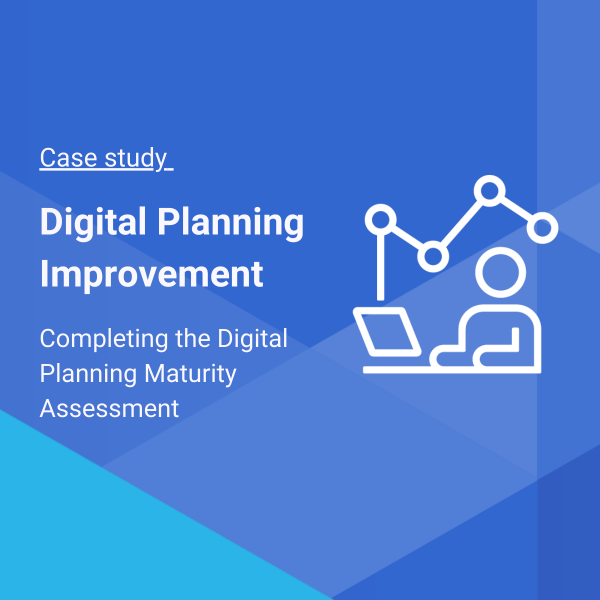Digital Planning Maturity Assessment (DPMA) process
Initially, the DPMA process seemed daunting to the team. However, the structured approach, divided into clear sections, made the task manageable. Responsibilities were shared across the team, with input from IT, system administrators, and the Head of Planning. Leveraging insights from the PAS review streamlined the process, allowing the council to complete the assessment quickly.
The DPMA was not just a compliance exercise; it became a tool for self-reflection, highlighting critical gaps and areas for improvement. For example, it revealed inconsistencies in data input and identified training needs for new staff. These insights have informed ongoing efforts to modernise and standardise the council's planning processes.
“The DPMA was not just a compliance exercise; it became a tool for self-reflection, highlighting critical gaps and areas for improvement. These insights have informed ongoing efforts to modernise and standardise planning processes.”
Horsham District Council
Learning and insights
While completing the DPMA itself was straightforward, the real challenges emerged in acting on its findings. The council identified several areas requiring significant effort:
- Data management: The council discovered gaps in strategic planning data and inefficiencies in using spreadsheets scattered across teams. They also lacked a consistent process for entering data into systems like Idox Uniform.
- Resource allocation: Limited staffing slowed progress in updating and publishing datasets, such as listed buildings. While the funding has been helpful, the council faces challenges in balancing expertise with resource needs.
- Customer-focused services: The DPMA highlighted the need to improve customer-facing tools. For instance, providing better online guidance could reduce the volume of calls to planning officers. This led to plans for integrating tools like PlanX to streamline processes and improve service delivery.
Being part of the ODP community
Horsham has actively participated in the ODP community, attending meetings and engaging with other councils. These interactions have provided valuable insights into best practices and innovative approaches.
Notable examples include:
- Exploring customer experiences by testing PlanX tools used by other councils, like Barnet Council.
- Connecting with geographic information system (GIS) experts from different councils for specialised knowledge sharing.
- Participating in user groups to exchange ideas and solutions, especially with councils using similar back-office systems.
The council has embraced a culture of curiosity, encouraging team members to ask questions, even if they seem simple, as this often benefits the broader community.
“We've embraced a culture of curiosity, actively participating in the ODP community to share knowledge, explore best practices, and adopt innovative solutions from other councils.”
Horsham District Council
Impact on strategy
The DPMA has been a catalyst for change at Horsham District Council, particularly in raising awareness about the importance of data across teams.
Key outcomes include:
- Enhanced reporting: Using tools like Microsoft Power BI (an analytics tool), the council has improved its ability to track and analyse planning data, identifying areas for optimisation, such as unnecessary applications.
- Improved data sharing: By publishing datasets such as Tree Preservation Orders, the council has begun to demonstrate the practical benefits of open data.
- Strategic planning: The DPMA highlighted opportunities to improve strategic planning data management - leading to plans for using a tool like LandClan to provide access to shared GIS datasets, manage site allocation and monitor progress effectively.
Advice for other Local Planning Authorities
Horsham’s experience offers several lessons for Local Planning Authorities (LPAs) joining the ODP community:
- Involve key roles: Engaging transformation officers, service designers, and GIS experts is crucial. These roles provide a broader perspective and technical expertise, ensuring that the project aligns with the council’s overall capabilities.
- Leverage existing resources: Sharing responsibilities across existing teams and using past reviews or assessments can make processes like the DPMA more manageable.
- Adopt a ‘start where you are’ mindset: Data doesn’t need to be perfect to be published. Begin with what you have and improve over time, focusing on transparency and progress rather than perfection.
- Engage with the ODP community: Participating in meetings, Slack channels, and working groups can provide inspiration, guidance, and practical solutions to challenges.
What’s next for Horsham
Horsham District Council is focused on several next steps to build on its progress:
- Publishing the remaining datasets, including listed buildings, despite challenges with missing data and limited resources.
- Exploring the use of tools like PlanX as well as new software to enhance planning processes and customer experiences.
- Encouraging a culture of collaboration and digital innovation within the authority.
The council recognises that the journey is ongoing, but the DPMA and ODP community have laid a strong foundation for a more digitally-enabled future.
Conclusion
Horsham District Council’s experience of Open Digital Planning and the Digital Planning Maturity Assessment demonstrates the transformative potential of open data and collaboration. By addressing challenges head-on and embracing a culture of innovation, the council is paving the way for a more efficient and customer-focused planning process. Their journey offers a valuable blueprint for other councils looking to embark on similar transformations.
